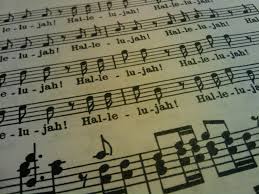 Today in 1686 we travel to Germany and the city of Halle and remember the birth of George Frederick Handel, composer of the oratorio "Messiah," which is now one of the best-known and most frequently performed choral works in Western music. The text, based on scripture compiled by Charles Jennens is a meditation of our Lord as Messiah in Christian thought and belief and was intended to challenge advocates of Deism, who rejected the doctrine of divine intervention in human affairs. Even though its official title is 'Messiah' I will refer to it as the Messiah from now on.
Today in 1686 we travel to Germany and the city of Halle and remember the birth of George Frederick Handel, composer of the oratorio "Messiah," which is now one of the best-known and most frequently performed choral works in Western music. The text, based on scripture compiled by Charles Jennens is a meditation of our Lord as Messiah in Christian thought and belief and was intended to challenge advocates of Deism, who rejected the doctrine of divine intervention in human affairs. Even though its official title is 'Messiah' I will refer to it as the Messiah from now on.As a young boy about 8 years old, Handel was noticed by Duke Johann Adolf I whilst playing the court organ in the palace chapel of the Holy Trinity, where he surprised everyone with his playing. Overhearing this performance and noting his young age the Duke recommended that he be given musical instruction. Coming under the tutelage of the organist at the Halle parish church, the young Friedrich Wilhelm Zachow who would become the only teacher that Handel ever had. When Zachow discovered the talent of Handel, he introduced him "to a vast collection of German and Italian music, which he possessed, sacred and profane, vocal and instrumental”. At this young age and thirsty t o learn it was an incredibly formative time, and at the same time Handel continued practice on the harpsichord, learned violin and organ, and developed a special affection for the oboe. Zachow, partly because of his fondness for wine and good company began to let Handel assume some of his church duties and so Handel performed on the organ frequently. This public performance in the sacred liturgical cycle, would have again spurred on Handels development. Those hours put aside preparing practicing and performing are resonant with Malcolms Gladwell’s theory of genius in his book ‘Outliers’ where he states that “ten thousand hours is the magic number of greatness”, During this time Handel also began composing, at the age of nine, church services for voice and instruments and within three or four years had surpassed his teacher.
After periods in Berlin and then Hamburg, Handel travelled to Italy at the request of one of the Medici family. Working in Rome and, since opera was (temporarily) banned in the Papal States, he composed sacred music for the Roman clergy. Then he moved to Florence, where he composed his first Italian Opera. In 1710, Handel became Kapellmeister to German prince George who in 1714 would become King George I of Great Britain and Ireland. In 1712, Handel decided to settle permanently in England. In the summer of 1713 he lived at Mr Matthew Andrews' estate in Barn Elms, Surrey where he received a yearly income of £200 from Queen Anne. Handel's reputation in England had been established through his compositions of Italian opera. But he adapted to English oratorio in the 1730s in response to changes in public taste; and the Messiah was his sixth work in this genre. Although its structure resembles that of opera, it is not in dramatic form; there are no impersonations of characters and no direct speech.
The Messiah is based on a scriptural text compiled by Charles Jennens from the King James Bible, and from the Coverdale Psalter, the version of the Psalms included with the Book of Common Prayer Jennens's text is an extended reflection on Jesus as the Messiah called Christ. Jennens was a wealthy land owner and a friend of Handel’s, a very committed Christian he was interested in Primitive Apostolic (Sabbatarian) Christianity and John Chrysostom. The text begins in Part I with prophecies by Isaiah and others, and moves to the annunciation to the shepherds, the only part taken from the Gospels. In Part II, Handel concentrates on the Passion and ends with the "Hallelujah" chorus. In Part III he covers the resurrection of the dead and Christs glorification in heaven. It was written for modest vocal and instrumental forces, with optional settings for many of the individual numbers, which allowed the work to be adapted for performance on a much larger scale, with giant orchestras and choirs. As a sign of how highly the oratorio was thought of, Mozart later revised and amplified its orchestration. However, more recently the trend has been towards reproducing a greater fidelity to Handel's original intentions. It was first performed in Dublin on 13 April 1742 and received its London premiere nearly a year later.
Towards the end of his life, Handel was seriously injured in a carriage accident between The Hague and Haarlem in the Netherland, and he was completely blind by 1752 although was to die 6 years later. Handel was buried in Westminster Abbey in a state funeral with more than three thousand mourners, he had never married, and kept his personal life private. He left the bulk of his estate to his niece Johanna, servants, friends and to charity.
The full podcast as always is on www.pogp.net ..... Have a lovely day and thanks for reading this if you've made it to the end!
